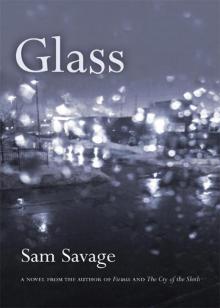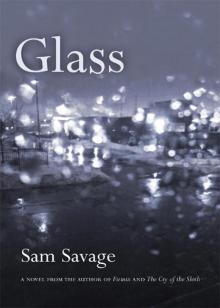- Home
- Sam Savage
Glass (Small Press Distribution (All Titles)) Page 11
Glass (Small Press Distribution (All Titles)) Read online
Page 11
Day before yesterday, I think it was, the last time I fed the fish, I forgot to put the lid back on the aquarium, and the snails must have climbed out. The snails obviously climbed out; there are no snails in the tank. I looked for them on the floor, and in the flowerpots, thinking those would be the sort of thing they would hide in, being snails, even if they are not garden snails. I found a flashlight in a kitchen drawer, intending to shine under the furniture in case they had crawled there. The bulb glowed a faint yellow for several seconds and then went completely out. I have left the top off the aquarium in case they decide to climb back in, as they might want to do, being water snails. I will have to watch where I step, especially on the dark-patterned carpets on which a brown water snail will be practically invisible. I sat in Potts’s husband’s chair and watched the fish while they ate, the miniscule wafers of food drifting slowly downward as gently as snowflakes, the fish dashing this way and that catching them in their mouths—snowflakes falling, I want to say, through the green air of summer. One year Papa carried me outside during a snowstorm, held me in his arms, and we walked up and down the driveway in front of the house. Giant cotton-ball snowflakes drifted down, and I opened my mouth and caught them, and the air then was blue and black. After watching the fish a while I dozed off in Mr. Potts’s rocker, and it was dark when I awoke. The stairwell light is out and climbing back up the stairs I had to feel my way along the wall with my hands. I was reminded of the cover picture on my copy of Crime and Punishment—Raskolnikov climbing a dark stairway in just that posture, on his way to kill a useless old woman. And now, I thought, I am the useless old woman, on my way to kill … what? Time, I suppose. I had settled back in my armchair, when I remembered that I had forgotten to water the plants, even though I had set out with precisely that in mind. I went to the window and looked out. It is raining again. The rat is whirring in its wheel. For hours at a time it does that now, even in the middle of the day. It seems to have become more active in recent days—an effect of the weather, I suppose, though maybe I am just noticing it more, because of the rain. Two days ago, when I was typing up the bit about the days passing like the windows of a speeding train and the subsequent bit about not knowing whether I was in Switzerland or France, it occurred to me that I did not at that moment know what day of the week it was, the name of the window, so to speak, that was currently flying past. That is, I did not know what day of the week it was while I was typing, not while I was on the train, though, of course, I don’t know that either after all these years, though I must have known it at the time—one cannot travel about, catching trains and booking rooms and such, without knowing what day of the week it is. Since I didn’t know what day of the week it was two days ago, I don’t, as a consequence, know what day of the week it is now, when I am once again sitting at the machine. I have been having a hard time lately keeping my thoughts from getting in a jumble. The jumble seems to become worse the harder I struggle to get things straight, as happens to insects in spiderwebs, when their struggle only makes things more difficult for them. Once when I was looking at the mess in my room I told Clarence I couldn’t live in a state of disarrangement anymore. He thought I had said derangement, and I found myself yelling, “I don’t need a doctor, I need a maid.” It was typical of Clarence to miss a distinction like that.
I can feel it almost physically in front of me—a vast intransigence against which I keep knocking my head. I can’t describe it exactly; I have never been able to obtain a clear view of it. Whether that is because it is too close or too far away I can’t decide. I only know that it impinges, that it is made of something extremely hard that will break my head if I don’t watch out, if I go on banging against it, and that it bars my way. On rare occasions, though, when the sun is out, the windows are open, and the birds are cheeping, I don’t feel it there and I become hopeful. I make a first cup of coffee and carry it to the little table, too excited to linger over breakfast. There will be time for that later, I think, but first…. And I pull up the chair and wind a fresh sheet of paper into the machine. Yet even as I am doing this I can feel my confidence ebbing, slipping away despite my (mental) attempts to hold on to it. This has been going on for a long time. And something is wrong with the begonias—they have dropped most of their leaves and there is a white moldy-looking fuzz on the stems.
I rode a train and two buses to get to Potopotawoc. I was on the second bus for hours, bouncing and swaying on a narrow, twisting, mountainous road overhung by tree branches on which the leaves were starting to turn. I was there before any of the others. I stood on the steps of the Shed and watched them arrive, spilling from the vans and buses in their funny hats. Some were dizzy from the gyrations of the road and staggered and blinked in the cool, bright September sun, others whistled and shouted or pumped a fist in the air as they climbed down from the vehicles, while the ones who had arrived before them clustered with the staff at the edge of the parking lot and clapped and waved. In former days Potopotawoc had been a summer camp for boys, and locally it was still called “the Camp.” For the residents too it was just “the Camp” and they called each other camper: it was “Hi, camper,” when you bumped into one of them on a path, and “Pass the ketchup, camper,” in the cafeteria. Unlike an actual camp, though, the others—the workers, the people in authority, if one can call them that—were not considered counselors—they were staff. “Staff” was sometimes a collective term, as in “Staff is having a meeting up at the Shed,” and sometimes not, as in “Watch out, Staff is standing beneath your window,” in a case where, when you leaned out, there was just one person crouching there. Some of the residents were famous in small ways, well-known in certain circles, but they were not distinguished, the circles were not distinguished, and they, the people, had gone to pieces or otherwise declined, lost their talent or impetus or whatever, and a stay at Potopotawoc was supposed to help them get it back; set them back on their feet, was the phrase. Considering their condition, the atmosphere was relentlessly jolly, partly I suppose because so many of them were oblivious—deluded is what they were, and a tidy number were drunks. Deluded about themselves and their prospects, I mean, deluded about their talent, not deluded in the wider hallucinatory sense. The camp consisted, geographically speaking, of a hill and a lake. On top of the hill stood a glass-fronted building of intensely modern style, with exposed girders and out-slanting walls of rough-hewn sandstone, called the Shed, in reference to the long sloping roof, which descended so low at the entrance that taller men sometimes cracked their heads going in, cursing. Next to it was an older and smaller brick building with decorative cornices and tall windows with steel muntin bars like an old-fashioned textile mill, and they called that one the Factory. Most of the residents, along with a portion of the staff, had rooms in the Factory. The rest of us stayed in cottages scattered about in the woods. I don’t know if it was by accident or design that nearly all the noisy hypersociable types had rooms in the Factory, where most of the incidents occurred, parties as well as fights, though usually not fistfights—word fights and water fights, toilet paper sometimes. They threw books sometimes. Most of the fights took place at their parties, I think. I never went to one of those, but I could hear them from my cabin. A wide meadow ran from the Shed down through the middle of the woods to the lake. There was a rotting boathouse at the edge of the lake and three or four battered canoes that were always drifting off and getting stuck in the reeds on the opposite side. The lake was too swarmed with weeds for swimming, and there were never any paddles. Most of the cabins were on the other side of the meadow from mine, so I did not often run across people if I stuck to the paths on my side.
The inhabitants of Potopotawoc, excluding Staff, were either permanent or provisional. I was provisional, permitted to hover at the margins and look on for three weeks in the fall, they said, and then they would see—see what kind of fit I was, is how they put it in their letter. That made me laugh when I read it, because of the word fit, which irritated Clarence, who had worked
hard, filling out applications and drawing on the influence of friends, to get me in. It was because of the pages Clarence had sent them, which he had gathered up without telling me—more or less at random, I am sure, since even then I never numbered—that they took me. He told them they were the first pages of my novel, the first chapter of a novel called Brunhilde’s Balcony that I had been working on for twenty years, though they actually were not the beginning of anything, just some things I had typed, Brunhilde being a person like me in most respects, like me as I was when I wrote them, not so much like me now that I have had time to think. The perms generally looked down on the temps, except for the women temps, whom they tried to take for themselves. There were fights over women, because there were not many of them, cliques were formed, and some people were not allowed to sit at certain tables in the cafeteria. It was as if people merely by setting foot on the soil became instantly infected with the spirit of boys past, a spirit corrupted by age and failure into a kind of juvenile levity that they hoped would appear devil-may-care, though anyone could see that it was just desperate. And the newcomers quickly succumbed: they might tumble out of the vans tight-lipped and hollow-eyed, but two or three days later, when I would bump into them at ping-pong or checkers, they would be perky as titmice. “Hi, camper,” they would chirp, “up for a game?” I had no idea why I was there. Staff organized them into teams; they played football and Frisbee in the meadow, and I heard them at night in the canoes, paddling about in the lake with their hands. Somehow or other I became mixed up with the perms. I don’t mean that I associated with them in particular, in a convivial way, aside from checkers, but that the people in charge took me for one. I was there every day, looking more or less rooted, and after a while no one thought to say “What are you doing here?” Perms were not expected to leave, or they were not expected to leave permanently—they went away in the fall and reappeared in spring, like ducks. Most of them reappeared, I should say, along with others who had not been there before or had not been there for a long time. And in that way Potopotawoc was constantly renewed. “Interesting,” someone said, the constant advent of new people; “interesting and rejuvenating,” that person said in a speech during the conclave in the Shed at the start of the second session. Looking around at the people, I could scarcely tell one from the other.
I stopped typing and went over and sat in the armchair. I was trying to remember, but the rat was scratching. Maybe it has fleas. When it scratches it thumps its elbow against the glass. I am not sure that part of a rat is an elbow. I was conscious of how much of Clarence has slipped away, but I could not think because of the thumping, and I said to myself, “Oh well, I will pick up my pages,” indicating in my mind the pages that have slipped off the table, which is pretty much all of them now. They are scattered across the floor, as I am sure I mentioned, and I have been walking on them. I have almost slipped a few times, because they skid about when I step on them. I put a sofa cushion on the floor and knelt on that, and reaching out as far as I could I dragged the nearest pages to me. I tried using one of the broken fronds as a pull-stick to drag the more distant ones nearer, but that was too wobbly at first and then it snapped. I made a stack of all the pages I was able to reach. Nigel had stopped thumping. I glanced up, and he was watching me, whiskers twitching, I imagine, though I was not close enough to make out anything as small as whiskers. I crumpled up one of the pages. Looking down at the floor as if inspecting something there and mashing and kneading slowly, so as not to arouse suspicion, I squeezed the crumpled page into a tight little ball. I lifted my head: he was still looking. ”What are you staring at?” I shouted, and I hurled the balled-up paper. I had the feeling while I was throwing it that it was going to crash right through the glass wall of Nigel’s tank like a stone. It left my grip, flew a few feet, and dropped to the floor, arrested in midflight as if swatted down by an invisible hand. I crumpled another. I balled this one up even tighter by rolling it around on the floor under the heel of my hand, while Nigel, unconcerned, watched me from above. This one flew the distance and struck the glass with a feeble tap. He jumped back but didn’t retreat into his tube. I didn’t make another ball—I can’t continue balling up pages and expect to make headway. I hoisted myself back into the armchair and sat there, clutching the chair arms, my heart pounding. I was glaring, or glowering, probably. Nigel was spinning in his wheel.
Today is Thursday. I went to Starbucks to find out what day of the week it is. At a table by the window was a woman I used to be friends with, but she seemed not to see me, and I am not going to talk about her now. And while I was there I ate an almond croissant and read the newspaper. I don’t usually buy the newspaper—I take a copy from the rack, read it, and put it back—because I am not interested in much that is in the paper these days, except the crossword. I went to Starbucks instead of the diner, where I usually go for coffee, because the newspapers at the diner are inside a coin machine on the sidewalk in front. Before putting the newspaper back on the shelf, I tore out the crossword puzzle, holding the paper against my thigh under the table and tearing very slowly, to not make a ripping noise. Usually when I do that I also write in pencil above the headline of the paper, “No Crossword Puzzle in This Paper”—that way anyone who wants the crossword puzzle, who like me, perhaps, is buying the paper only for that reason, will know to choose a different copy. I didn’t bother doing that today. I don’t know why. On the way home I stopped at the grocery and bought batteries for the flashlight and seedless grapes in a transparent plastic bag. Instead of Elvie a young woman I don’t know was at the register. Where in the world do grapes come from at this time of year? I wonder if I have mentioned the season. Probably not, but I am not going to look back through all my pages to check. Instead, I will say right now, for the record, that by “this time of year” I am referring to late spring. It cannot be winter, obviously, or I would have mentioned being cold, which I am sure I have not done since I talked about my trip to the typewriter store, a trip that, at the time I mentioned it, was already weeks in the past. We have not for months had the sort of unbearable cold we had during the pit of winter and that I would certainly have touched on had I been typing then. At times, when Clarence and I were relatively impoverished, the houses were so cold I wore fingerless gloves while I typed, and also later, during the winters at Potopotawoc. I never thought of wearing gloves like that when I was horribly cold in the farmhouse in France, which I intend to talk about at some point, and that is odd, since I recall that one of the workmen who came to replace windowpanes in Papa’s house one snowy winter day was wearing gloves just like that, so I must already have known about them when I was in France, known that things like fingerless gloves exist. I bought my first pair at a hardware store in Ocean City, New Jersey, when we were impoverished near there. At Potopotawoc I came across a pair of wool gloves under a chair in the Shed and snipped the tips off the fingers, but even so my fingers turned blue on the really cold days. And that might be the reason I stopped typing there, and not anything that was going on in my head or anything people said. One day I forgot and wore those gloves when I went up to the Shed, and a camper said, “Hey, aren’t those my gloves?” When he saw I had cut the fingers off, he said, “Hell, you might as well keep them now.” I don’t know if I have mentioned this before, the fact that I stopped typing there. That was the only time, before coming here, that I completely stopped typing for a long while, though Clarence had tried several times to convince me that I ought to stop, when he thought I was typing too much and not eating properly, by which he meant at a table in a civilized manner instead of at the machine, especially when we went on vacation. In fact I hated getting crumbs in the machine and never ate there unless I was typing things I was afraid of losing, worried they would fall out of my head if I went and sat at the table with the others, paying attention to their conversation and so forth. Clarence wanted me to pay attention to the countryside, which was green and peaceful, probably, or sun-struck and stark, depending—we went
to a variety of places on vacation. In Starbucks there are always a lot of people typing on computers. I see their fingers moving but I don’t hear any sounds, and I am not able to banish the suspicion that they are pretending. They did not, at Potopotawoc, want to give me back my typewriter at first, but I insisted. I told the director I was not going to leave his office until he gave it to me. And I kept it with me after that, carrying it up and down the hill between my cabin and the Shed several times a day and resting my feet on it in the cafeteria.

 It Will End With Us
It Will End With Us The Cry of the Sloth
The Cry of the Sloth Glass
Glass An Orphanage of Dreams
An Orphanage of Dreams Firmin
Firmin Quantum Voices
Quantum Voices Glass (Small Press Distribution (All Titles))
Glass (Small Press Distribution (All Titles))